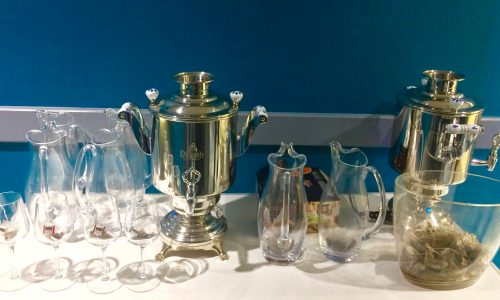A few words about the interesting presentation that Catherine Nicolas, a specialist in tea tasting and educational methods, gave us.
The samovars are plugged in and an unusual odor of plants and fruit is penetrating the tasting room; quite a surprise for first year MBA students who are beginning their discovery workshop with the famous brand of tea, Dilmah Tea.
“Tea and wine have a lot of things in common,” explained Olivier Demange, who is the South-Western Regional Manager at TWF. “We both use the same language: astringency, tannins, terroirs, etc. The Wine Stewardship M.O.F. (Best Worker in France), for instance, also has a training module on tea. What Catherine does the best is to dust off Granny’s tea to restore its former glory.”
Like good wine
So, during her presentation, Catherine Nicolas, a sommeliere specialized in tea since 2012, talked about the similarities between these two beverages:
- both grape vines and tea trees are natural products that men transform into beverages;
- just like wine, tea has its own vintages, its own aromas, and certified names;
- wine and tea both go with a certain type of food.
“This workshop was really an added value in our courses,” said Lauriane Oudot, enthusiastically. “I never would have thought about this beverage from a professional outlook. After this tasting session, I’ll now be proposing a tea list and know how to present tea to our clients, in the same way that I do so for wine.”
Respecting the product and the people producing it
Beyond its product, Dilmah is an irreproachable brand as it controls the entire production process, from its own plantations in Sri Lanka up until the cut of tea you can drink. It is determined to “break away from colonial traditions, which meant that tea was produced at a low price and that profits benefitted the leading brands only in mature countries.” This ethical dimension goes even farther as the company hat Merrill J. Fernando founded earmarks 10% of its income to two charitable foundations:
How to make a good cup of tea
Students loved this tasting session. And beyond taking them on a trip, Catherine Nicolas didn’t forget to teach them how to make a good cup of tea.
- Use 2g of tea for 200 ml of water.
- Use water with a low mineral content to avoid the deposit of mineral particles which will absorb the tannins and turn into limestone.
- For black tea, boil the water between 95 and 100° C, then put the tea bag into the cup and pour the water in
- Let the tea infuse for 3 to 5 minutes.
- For green tea, boil the water between 75 and 85° C and let the tea infuse for 2 to 3 minutes.

